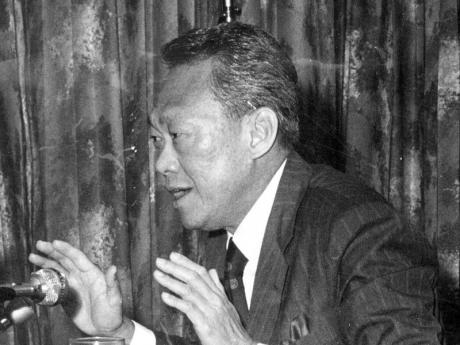A blueprint for a better Jamaica
Julian 'Jingles' Reynolds, Guest Columnist
It is not that Jamaica is a failed state, in my opinion, as expressed by some, most lately among them, former Prime Minister Edward Seaga. The issue is that the potential of the country is far from being fulfilled. The political leadership, as borne out by the ongoing Manatt, Phelps & Phillips commission of enquiry and the FINSAC commission of enquiry, is far behind the expectations and intelligence of the Jamaican people, at home and throughout the diaspora.
A country that, over a span of 200 years, has produced and contributed to the world Mary Seacole, Marcus Garvey, Bob Marley, Bert Fraser-Reid, Michael Manley, Patrick Ewing and Usain Bolt; contributed to world cultures ska, rock steady and reggae music; produced a family that migrated to the United States and produced a General Colin Powell; and attracts two million people annually to visit cannot be considered a failed state. Mr Seaga, having contributed nearly 50 years to Jamaica's political life, should not want to contribute to a failed state as his legacy.
Responses to my article 'Will Jamaica ever learn?' in The Sunday Gleaner of March 6, several asking me to explain the allusion to my Develop Jamaica Initiative, two articles appearing in The Sunday Gleaner of March 20 by Claude Clarke and Paulette Dunn-Smith; an article appearing in The Gleaner of March 24 titled 'Failure' and quoting Mr Seaga; and an interview on the PBS programme 'Charlie Rose', aired in the United States on March 28, of former prime minister of Singapore, Lee Kuan Yew, have prompted me to write this article.
From writings going back at least 12 years, I have drawn comparisons of Singapore's socio-economic development to that of Jamaica's. Several others have joined in making that comparison. The two articles referred to from the March 20 edition of The Sunday Gleaner both coincidentally drew upon Singapore's success in developing one of the most advanced world economies over the last 50 years.
In my article of March 6, I made reference along with Singapore's to Japan's and China's rate of growth. But because of similarities as small nation states, comparable sizes and shared colonial experiences under British Commonwealth governance, it is fair to juxtapose Jamaica and Singapore.
In Clarke's emphatic piece titled 'The delusion of remittances', he highlighted the several visionary applications Lee brought in evolving Singapore into a First-World society, with emphasis paid to education and "culture in determining a country's fate", to stimulate Singapore's development. Dunn-Smith's article, titled 'The Singaporean model', highlighted Singapore establishing The Workforce Development Agency, a "model public-sector agency dedicated to skills training and improving the workforce productivity".
Develop jamaica initiative
In October 2006, in a presentation to the Rotary Club of Downtown Kingston luncheon at the Hilton hotel, I presented the Develop Jamaica Initiative (DJI). I will here present it in an updated form. The initiative calls for:
1. Secure financing of US$200 million to be raised through bond issue, international aid financing, and soft loans from the World Bank, the Inter-American Development Bank, and a consortium of international commercial banks. The capital raised is to be used only for investing in targeted developmental projects presented by entrepreneurs and established businesses. Provide an operating budget of not more than US$5 million per annum to administer the initiative. Investments or loans should not exceed US$10 million in any project.
2. Establish an executive committee, a public-private sector partnership, to set policy and oversee the DJI chaired by the prime minister and/or minister of development, with one representative each from government ministries; and one representative each from the Opposition, Jamaica Manufacturers' Association (JMA), Jamaica Exporters' Association, Jamaica Chamber of Commerce, Jamaica Agricultural Society, Small Business Association of Jamaica, Jamaica 4-H Clubs, Scientific Research Council, Jamaica Bankers' Association, and the Private Sector Organisation of Jamaica. The committee is to meet once per month. Projects to be undertaken by the DJI must have a two-thirds majority vote of the committee.
3. Establish a board of advisers comprising international expertise such as the economist Jeffrey Sachs from Columbia University; Dambisa Moyo, author, economist and investment banker; economist Andrew Brimmer of Black Enterprise Board of Economists; William Spriggs, United States economist and educator; Jamaican educators and social scientists Dr Basil Wilson, former provost of John Jay College, Dr Norman Girvan economist and social scientist from the University of the West Indies, and Dr Don Robotham of City University of New York Graduate School; corporate attorney Maureen Denton the director of the Research Committee of Jamaica, the international financier George Soros, Wall Street stockbroker Muriel Siebert, General Colin Powell, and Lee Kuan Yew. This body would meet twice yearly in Jamaica.
4. Establish an administrative body headed by an executive director/development czar supported by a small staff. This position should be held by someone with industrial experience, knowledge of working with the political system, and an unbending commitment and passion to transform Jamaica. Ideal candidates would be Claude Clarke, industrialist, former politician and columnist; Dr Rosalea Hamilton, manufacturer, educator and political adviser; and Omar Azan, industrialist and president of the JMA.
5. Assemble a database of managers, marketing executives, lawyers, accountants, and technocrats to be placed in companies with projects that are financed through investments or loans by the DJI, that need this expertise to develop. Personnel is to be drawn heavily from the diaspora.
6. Launch the DJI, inviting entrepreneurs and companies to present proposals for projects and undertake a two-week tour of the US, Canada, Europe, Japan, Singapore, Ghana, and Trinidad and Tobago.
7. The prime minister or minister of development, in the capacity of chairman of the DJI, and the executive director/development czar will appear before Parliament twice per year to make a report on the operations of the DJI.
The emphasis for Jamaica must be on development, increasing production and productivity, with a clear message sent to all Jamaicans and the world. Targets must be set, for example, to grow the economy by seven per cent over the next two years, and with nation building as the mantra, with all citizens contributing to meeting these targets.
Investments and loans should be made primarily to targeted industries but not exclusive to those. Sectors targeted should be agriculture/agro-industry (fishing, food processing from orchard crops to traditional herbal plants), the entertainment industry (music, film, television and live performances), tourism (with emphasis on attractions and the rebirth of Kingston as a prime destination), should alternative energy, information technology and telecommunications, mining, fashion, furniture, craft, health care, childcare, and sports. Special emphasis, be placed on research and development.
New Fiscal policies needed
Government must set monetary and fiscal policies to drive development. For example, much lower interest rates, preferably single-digit rates. The removal or lowering of transfer tax, in some instances, that will allow property ownership and transfer of titles from one generation to the next. In general, there remains too much unnecessary bureaucracy throughout the government agencies and, too, the private sector.
Jamaica's growth has been disappointing. It has a per capita gross domestic product (GDP) of US$8,200, ranked 123rd in the world, a negative growth rate of -4.2 per cent, and a 14.2 per cent unemployment rate as of 2009. The population of approximately 2.7 million is on a land mass of 4,240 square miles.
Singapore's economy today ranks sixth in the world with a per capita GDP of US$57,000, an annual growth rate of 14.3 per cent, a 2.1 per cent unemployment rate, and a population of approximately five million on a land mass of 247 square miles. It is a 'city-state' with virtually no land for agricultural production, forcing it to import almost everything. In 1966, four years after Independence, Jamaica had a per capita GDP of US$615.08 and ranked 37th in the world economy. Singapore, in 1966, one year after its independence, had a per capita GDP of US$561.23 and ranked 41st in the world economy.
It is instructive to take note of the aforementioned interview of Lee Kuan Yew by Charlie Rose. In response to a question by Mr Rose on language and culture in transforming Singaporean society, Lee responded: "I once went to Jamaica for a Commonwealth conference, and I'll never forget this. They took over an American holiday resort to house us, so all the cooks and so on were blacks and good cooks. But they spoke in a quaint accent. And so I went out to watch the fishermen bring the fish in. I asked him what kind of fish? He says damn spats. I couldn't figure it out. Oh, sprats. Well, that was the result of an amalgamation of many African dialects with the slave masters' language. We inherited the English language from the British. They decided in this multiracial society (Singapore) to make it the working language and Chinese, Malay, Indian, whatever, the second language." I do not believe this is the only experience with Jamaica that influenced his approach towards transforming the Singaporean society,
Culture important
The cultural practices so vital to a country's development, alluded to by Lee, in the circumstances of Japan, Singapore and China are borne out of their history of Confucianism and Buddhism that promote unity of purpose, sacrifice, community over individualism, saving, hard work, discipline, education, and patience. But also fundamental to these countries' development are their governments' roles in their countries' economic life. So profound is Japan's that it is referred to as Japan Inc. Both the Chinese and Singaporean governments, through government-controlled agencies, own more than 50 per cent of their country's assets and investments. It is true that there have been gradual declines of government involvement in all three cases, but it was crucial to the development and growth of these economies.
Even the United States, the champions of laissez-faire capitalism, provided railroad companies with land grants and public subsidies in the 19th century in its effort to open up the American West. It has continued providing subsidies to agriculture, although the sector is almost totally in private ownership, and enacted the Sherman Antitrust Act in 1890 to control monopoly and price fixing. The biggest change in the government's role in the economy occurred during the New Deal, President Franklin D. Roosevelt's response to the Great Depression. "During this period in the 1930s, the United States endured the worst business crisis and the highest rate of unemployment in its history. Roosevelt and the Congress enacted a host of new laws that gave government the power to intervene in the economy. Among other things, these laws regulated sales of stock, recognised the right of workers to form unions, set rules for wages and hours, provided cash benefits to the unemployed and retirement income for the elderly, established farm subsidies, insured bank deposits, and created a massive regional development authority in the Tennessee Valley," according to a US State Department report.
Its most recent major involvement was the financial rescue plan providing billions of dollars to save the insurance, automotive and banking sectors save or create jobs, jump-start the economy, and restore liquidity to the financial markets, so as to save the country from recession.
For Jamaica to realise prosperity, its leadership - Government and private sector - must engage in creative and proactive socio-economic applications. Not only Jamaicans at home and in the diaspora, but the world expects more for Jamaica.
Julian 'Jingles' Reynolds is a writer, filmmaker and entrepreneur who operates in New York and Jamaica. Email feedback to columns@gleanerjm.com.


